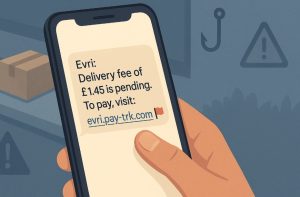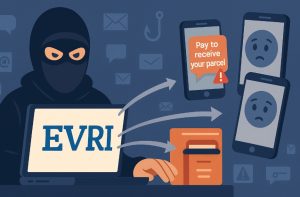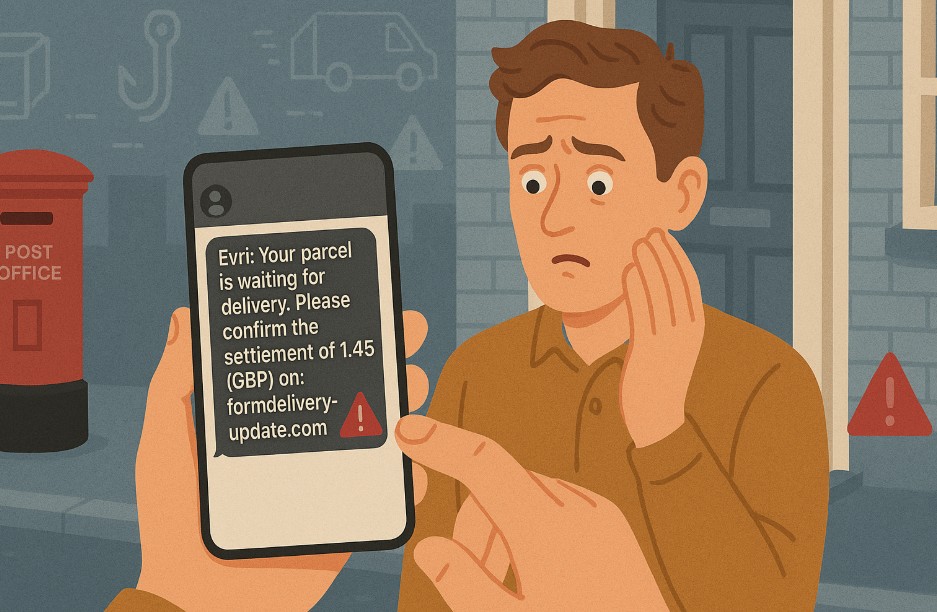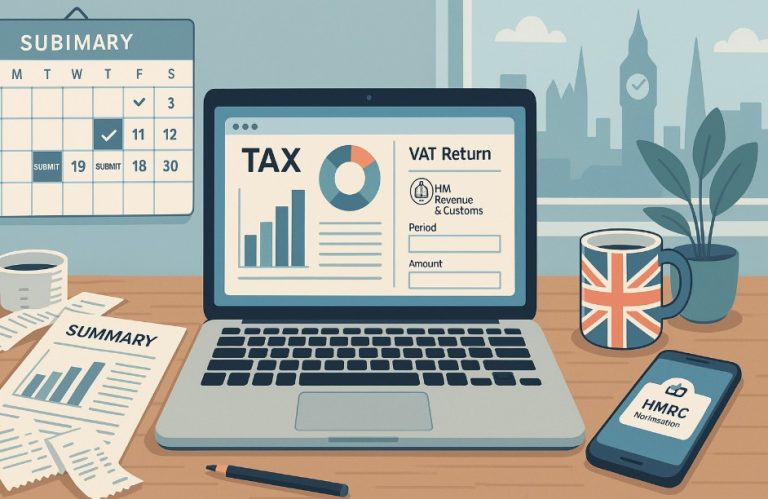Evri Package Notification Text Scam: What UK Consumers Need to Know?
Online shopping has become a mainstay in the lives of UK consumers. With millions of parcels moving through courier networks every day, scammers have capitalised on this dependency by impersonating delivery companies.
Among the most prevalent forms of digital fraud is the Evri package notification text scam, where fraudsters send fake messages claiming to be from Evri, formerly known as Hermes.
According to a recent report by the NatWest Group, fake parcel delivery texts have become the fastest-growing type of scam in the UK. Evri itself confirmed that incidents linked to these fraudulent messages surged by over 400% in 2024.
The company also reported shutting down over 12,000 scam-related websites in October 2024 alone, highlighting the scale of the problem.
These scams are not just an inconvenience. They represent a serious threat to the financial and digital security of individuals across the country. Recognising the signs and knowing how to act is crucial in avoiding financial loss and identity theft.
What Exactly Is the Evri Package Notification Text Scam?

The Evri package notification text scam is a form of cyber fraud known as “smishing,” which stands for SMS phishing.
Scammers send fraudulent texts or emails pretending to be from Evri, luring individuals into clicking malicious links or providing sensitive personal information under false pretences.
These messages typically claim that:
- A parcel could not be delivered and needs rescheduling.
- An additional delivery fee must be paid.
- There is missing or incorrect delivery information requiring immediate correction.
Once clicked, the links in these messages redirect the user to a counterfeit website that imitates Evri’s branding and layout. The user is then prompted to enter personal information such as name, address, phone number, and even banking details.
In some cases, victims are tricked into paying a small fee, which gives the scammers access to their payment information for more substantial fraud later.
Common Examples of Scam Messages:
- “Evri: Your parcel is waiting for delivery. Please pay £1.45 via [fake link].”
- “We attempted to deliver your parcel. Reschedule delivery here [link].”
- “Delivery failed. Please update your details immediately [malicious URL].”
How Can You Tell If an Evri Text Message Is a Scam?
Distinguishing between a genuine and a fraudulent message can be challenging, especially when the scam is designed to mimic official communication. However, several key indicators can help alert consumers to a potential scam.
One of the first red flags is an unexpected delivery notice, particularly if you are not waiting for a parcel. Genuine communications from Evri are usually in relation to an active delivery or ongoing claim.
Poor spelling, grammar, or formatting are also common in scam messages. Fraudulent texts may use phrases like “Dear Customer” or even “Dear [your email address]” instead of your actual name.
Although scammers are getting better at personalisation, generic greetings are still widely used.
Many scam messages include hyperlinks or buttons that appear urgent or alarming. These links often use domains that mimic official ones, such as evri.delivery-update.com, but are not genuine. Before clicking any link, hover over it to see the true destination.
Scam emails also tend to come from suspicious addresses that include small misspellings, extra characters, or unusual formatting. Genuine Evri communications will usually be sent from one of the following domains:
- @evri.com
- @hermes-europe.co.uk
- @myhermes.co.uk
In addition, real Evri SMS messages:
- Will come from “Evri”, not from a random mobile number.
- Will not ask for payment via text.
- May contain a tracking link starting with https://evri.link/…, but even if this format appears, verify it directly on Evri’s website.
What Tactics Do Scammers Use in the Evri Delivery Scam?

Scammers rely on urgency and fear to manipulate victims into acting quickly. This is a psychological tactic known as social engineering, and it’s a key part of the Evri package notification text scam.
By suggesting that a delivery has failed or will be cancelled unless immediate action is taken, scammers create a false sense of emergency. This makes recipients more likely to click on malicious links without questioning their authenticity.
Additionally, scammers leverage fake websites designed to look nearly identical to Evri’s legitimate site. The resemblance can be so close that even cautious individuals can be deceived.
These pages may ask for a small “re-delivery fee,” which, although minimal, allows scammers to test if the payment method is valid and may lead to further theft or fraud.
What Should You Do If You Receive a Suspicious Evri Text?
The first step is not to panic. Many people receive scam texts and emails regularly. The key is knowing how to handle them safely.
If you receive a suspicious message claiming to be from Evri:
- Do not click on any links or respond to the message.
- Take a screenshot of the message for reporting purposes.
- Forward the message to 7726 – the UK’s free spam reporting service.
- Delete the message after reporting it.
To verify whether a message is genuine, do not use any contact information provided in the message. Instead, go directly to the Evri website and use their contact page.
If you’re unsure, log in to your Evri account and check your parcel status through official channels.
Legitimate messages from Evri will never request payment or sensitive information via text. Always verify before acting.
How Can You Protect Yourself from Future Parcel Scams?

Being proactive about cybersecurity is essential in today’s digital environment. Here are effective ways to safeguard yourself:
Enable two-factor authentication (2FA) on accounts that handle personal or financial data. This adds an extra layer of security and makes it more difficult for scammers to access your accounts even if they obtain your login credentials.
Monitor your bank accounts and credit card transactions regularly. If you notice anything unusual, contact your financial institution immediately.
Use official communication channels whenever possible. If you receive a message and are unsure of its authenticity, go to the courier’s website directly and access your information there.
Be cautious of links and attachments in unsolicited emails or texts. Even if a link looks legitimate, it could redirect you to a fake site.
Install antivirus and anti-spam software to block known scam messages and malicious sites.
Evri also provides security resources for consumers, including guidance on identifying scam communications. Their dedicated cybersecurity pages offer tips and official channels for reporting fraudulent activity.
Who Is Most at Risk and Why Should UK Consumers Care?
Certain demographics are more susceptible to scams, particularly older adults and individuals who are less comfortable with technology.
However, anyone expecting a delivery can fall victim, especially those who frequently use online marketplaces like eBay, Vinted, or Facebook Marketplace.
Falling for an Evri scam message can lead to more than just immediate financial loss. Victims may also experience identity theft, which can have long-lasting effects on credit ratings and financial wellbeing.
The emotional toll, including stress and anxiety, can also be significant.
As scams continue to grow more sophisticated, awareness and vigilance are more important than ever.
What Are the Final Thoughts on the Evri Package Notification Text Scam?
The Evri package notification text scam is a reflection of how cybercriminals adapt to trends in consumer behaviour. As the convenience of home delivery becomes integral to modern life, scammers exploit it with alarming effectiveness.
While Evri has made commendable efforts in shutting down fake websites and issuing consumer alerts, the responsibility also falls on individuals to remain informed.
Understanding the warning signs, verifying communications, and taking swift action when something feels off can significantly reduce the chances of falling victim to these scams.
If a message seems suspicious, stop and think before clicking. When in doubt, consult the official Evri website and avoid using any contact details or links provided in unsolicited messages.
What to Do If You’ve Fallen Victim to an Evri Scam?

If you suspect you’ve entered information or made a payment through a scam message, act quickly:
- Contact your bank immediately to report the incident and block unauthorised activity.
- Change any compromised passwords, particularly if you use the same credentials across multiple platforms.
- Report the scam to Action Fraud and the National Cyber Security Centre (NCSC).
- Monitor your accounts for any signs of unusual transactions.
- Place a fraud alert on your credit report to help protect against identity theft.
- Seek legal assistance, if necessary, especially if financial losses are substantial.
Support Through CEL Solicitors
Victims of text and email scams do not have to face the aftermath alone. CEL Solicitors offers expert legal advice on scam recovery, operating on a no-win, no-fee basis.
Their services include support in reclaiming stolen funds and guiding victims through the legal process. Contact CEL Solicitors at 0333 242 7128 or complete their online form for assistance.
FAQs About the Evri Package Notification Text Scam
How can I check if an Evri email or text is genuine?
Genuine messages will use your name, come from an official email domain, and never request payment via SMS. Hover over any links to confirm their legitimacy.
What should I do if I clicked on a fake Evri link?
Disconnect from the internet, run a security scan on your device, and monitor your financial accounts. If you entered sensitive details, inform your bank immediately.
Are there official Evri emails or text domains I can trust?
Yes, official emails come from addresses ending in @evri.com, @myhermes.co.uk, or @hermes-europe.co.uk. SMS should display “Evri” as the sender name, not a number.
Can scammers use links that look like Evri’s real domain?
Absolutely. Scammers use subtle alterations in domain names to trick users. Always type www.evri.com directly into your browser to be safe.
What are the risks if I provide payment details to a scammer?
Scammers can access your bank account or credit card, make unauthorised purchases, or sell your data on the dark web. Contact your bank and freeze the account if needed.
Who should I report an Evri scam message to?
Report to 7726 (spam SMS), Action Fraud, and the NCSC. Also notify Evri through their official contact page.
Is there a legal way to recover money lost to an Evri scam?
Yes. Legal services like CEL Solicitors can help recover funds lost to digital scams. They provide guidance and representation in scam recovery claims.







